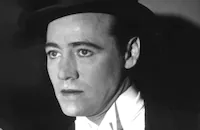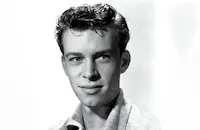Tomorrow, the World!

Brief Synopsis
Cast & Crew
Leslie Fenton
Fredric March
Betty Field
Agnes Moorehead
Joan Carroll
Edit Angold
Film Details
Technical Specs

Synopsis
The household of widower Mike Frame, a chemistry instructor at a Midwest university who is also engaged in secret war work, is anxiously awaiting the arrival of Emil Bruckner, the twelve-year-old son of Mike's late sister, who married and lived in Germany with the great German liberal leader Karl Bruckner. Both Bruckner and his wife perished in a German concentration camp, and consequently, Emil, now orphaned, is being sent to live with his American uncle. Mike's daughter Pat eagerly anticipates the arrival of her cousin, while Mike's spinster sister Jessie, an ardent anti-Nazi, disapproves of the boy joining their household. Frieda, their German housekeeper, is happy to welcome her fellow countryman, and Leona Richards, a Jewish schoolteacher and Mike's sweetheart, is warmly supportive of Mike's decision to accept him. When Emil fails to arrive on the train, Pat and Frieda become worried. Having just proposed to Leona, Mike invites her home for lunch, and soon after they arrive, Emil appears and calmly announces that he has come by plane. The extremely formal boy is suspicious of his new family's friendliness and voices a loathing for his father, who has once Mike's teacher. Thunderstruck upon discovering that Leona is Jewish, Emil makes an antisemitic remark and then goes to his room. After he leaves, Mike and Leona discuss getting married, even though their marriage would mean that Leona must refuse a lucrative offer from a Chicago school. In his room, Emil changes into his Hitler Youth uniform and later savagely attacks Frieda when she rejects his attempt to recruit her to the Nazi cause. Terrified by the boy's aggressiveness, Frieda calls for help, causing Leona and Mike to have a serious talk with the boy. After answering their questions with Nazi stock answers, Emil accuses his father of being a traitor because the liberals caused Germany to lose the war in 1918. After Mike and Leona leave the room, Emil viciously slashes the portrait of his father that is hanging on the wall. At school, Emil is assigned to Pat's class, which is being taught by Leona. With his arrogance and intolerance, Emil quickly engenders the hate of his classmates. Upon learning of Mike's impending marriage, Emil launches a campaign to divide the family and manipulates Jessie into feeling that Leona is breaking up her home. When Emil gets into a fight with Stan, a boy of Polish descent, Millie, a classmate whose American father is being held prisoner in a German camp, testifies that Stan attacked Emil. Later, Millie confesses that Emil threatened to write to Germany and have her father executed unless she testified for him. Forced to apologize before the class, Emil screams that he is being persecuted and, after running out of the classroom, he uses a piece of chalk to scrawl on the sidewalk that Leona is a "Jewish tramp." Emil then runs home and shrewdly apologizes to Mike. When Leona demands that Emil be punished for his actions, Mike, who believes Emil's insincere apology, defends the boy, causing Leona to break their engagement and accept the job in Chicago. Soon after, Pat catches Emil rifling Mike's desk in search of secret papers from the War Department, and when she threatens to tell Mike, Emil attacks her with a poker. When Pat is discovered unconscious, Emil flees and Mike sends the police after him. The incident brings Leona back to the house and she reconciles with Mike and Jessie. Stan and several of Pat's friends chase Emil, and after Stan thrashes him, the boys take him back to the house. Insane with rage, Mike almost chokes the boy to death before Leona stops him. After sending Mike out of the room, Leona talks to the boy and finds him subtly changed. When Emil discovers that Pat has borrowed a year's advance on her allowance to buy him a watch for his birthday, he breaks down and cries. Mike calls the police to take Emil away, but Pat, now conscious, and Leona urge him to give the boy another chance. When Emil stammers that he now realizes that his father was a brave man and recalls the beatings he suffered at the hands of the Nazis, Mike understands that the boy has been an innocent victim of the Nazis and allows him to stay.

Director

Leslie Fenton
Cast

Fredric March

Betty Field

Agnes Moorehead

Joan Carroll

Edit Angold

Skippy Homeier
Rudy Wissler
Boots Brown
Marvin Davis
Patsy Ann Thompson
Mary Newton
Tom Fadden
Crew
Louis Applebaum
Leopold Atlas
Anne Bauchens
Edward G. Boyle
Leon Charles
Lester Cowan
Lester Cowan
David Hall
Ray Heinz
Ralph A. Houston
Max Hutchinson
Ring Lardner Jr.
Joseph Lefert
Odette Myrtil
Ann Ronell
Ned Scott
Henry Sharp
Lou Smith
James Sullivan
Ern Westmore

Film Details
Technical Specs

Articles
Tomorrow the World
Young Homeier started his career in radio in his native Chicago at the age of 6. After Tomorrow the World, he was often tapped for pictures as a troubled, usually unsympathetic adolescent. As he aged, his on-screen name changed first to simply "Skip," then to "G.V. Homeier" (initials for his real name, George Vincent). As a young man in the 1950s, he often appeared in crime dramas, such as Cry Vengeance (1954), and Westerns like Budd Boetticher's The Tall T (1957), though his most famous role in this genre was as Jimmy Ringo in The Gunfighter (1950). In later years, he worked mainly in television, most notably as Judge Older in the Manson murders docu-drama Helter Skelter (1976).
The other leads from the stage version, however, did not get cast in the film version. Ralph Bellamy had extensive experience in motion pictures by 1944 - often as the "other man" in such screwball comedies as The Awful Truth (1937) and His Girl Friday (1940), but March, a distinguished stage performer himself, was considered to have more star power. Betty Field took over the role of March's girlfriend that was played on Broadway by Shirley Booth. A popular theater and radio star, Booth didn't get her first motion picture break until she was 54 years old, recreating her stage role in Come Back, Little Sheba (1952) and winning a Best Actress Oscar in the bargain. For Field, the part of Leona was one of many acclaimed appearances between the late 30s and late 40s in such films as Of Mice and Men (1939, her debut), King's Row (1942), Jean Renoir's The Southerner (1945), and as F. Scott Fitzgerald's Daisy in The Great Gatsby (1949). She never achieved star status, however, and after Gatsby she made few films, usually turning up in supporting roles as a neurotic older woman in such movies as Picnic (1955), Bus Stop (1956), Butterfield 8 (1960), and Birdman of Alcatraz (1962).
Another rising star at the time of this film's release was screenwriter Ring Lardner Jr., son of the famous Algonquin Round Table wit. Lardner Jr. was an uncredited contributor to the screenplays of A Star Is Born (1937), Nothing Sacred (1937), and Laura (1944). He also won an Oscar (with Michael Kanin) for penning the Tracy-Hepburn vehicle Woman of the Year (1942). But the values of tolerance and decency Lardner preached in Tomorrow the World didn't hold up too well in Hollywood a few years later. Blacklisted as one of the Hollywood Ten, he could not work under his own name between 1949 and 1965. Even his uncredited or pseudonymous work (under the name Philip Rush) was infrequent. It wasn't until he was billed for the screenplay of The Cincinnati Kid (1965) that he came back into official favor in the movie industry. Lardner won another Academy Award for Best Adapted Screenplay for M*A*S*H (1970).
Tomorrow the World was one of a small handful of films of the period, among them The Seventh Cross (1944), that sought to depict the everyday German. Instead of focusing on cruel Nazi stereotypes, the film concerned itself with those who were misguided or victimized by Hitler's brutal regime. Nevertheless, the world was still at war in 1944, and young Nazi Emil had to be dealt a firm hand before he could be redeemed in the eyes of audiences. A lot of the credit for making his transformation believable has to go to the young Homeier and director Leslie Fenton, a former actor known more for action-adventure stories up to this point.
Director: Leslie Fenton
Producers: Lester Cowan, David Hall
Screenplay: Ring Lardner Jr., Leopold Atlas, based on the play by James Gow and Armand d'Usseau
Cinematography: Henry Sharp
Editing: Anne Bauchens
Art Direction: James Sullivan
Original Music: Louis Applebaum
Cast: Fredric March (Mike Frame), Betty Field (Leona Richards), Agnes Moorehead (Jessie), Skippy Homeier (Emil Bruckner), Joan Carroll (Pat Frame).
BW-86m.
by Rob Nixon

Tomorrow the World
Quotes
Trivia
Notes
News items in Hollywood Reporter yield the following information about this production: Producer Lester Cowan bought the rights to James Gow and Arnaud D'Usseau's stage play for $75,000 plus 25% of the gross, not to exceed a total of $350,000. Cowan initially considered Elliott Nugent and Leo McCarey to direct the film, and playwright Victor Wilson was first hired to write the screenplay. The contributions of Wilson to the completed film, if any, have not been confirmed. In May and June 1944, Cowan wanted to cast "Quiz Kid" Ruth Duskin as "Pat" and tested Scotty Beckett and Claude Binyon for the role of "Emil." Skippy Homeier, who was finally cast as "Emil," also played the role on Broadway. This marked Homeier's screen debut. Edit Angold also appeared as "Frieda" in the Broadway production. Although July 1944 news items add Voyt Williams, Frances Norris, Ruth Warren, Fred Chapman and Ralph Hoops to the cast, their participation in the released film has not been confirmed.
In August 1944, Cowan announced he was changing the title of the film to The Intruder, initiating protests from Gow and D'Usseau. Cowan decided to retain the original title Tomorrow the World after a group of exhibitors voted in favor of that title. The picture was awarded the first "Writer's Award" by the Hollywood Writer's Mobilization, a group of radio and screenwriters who contributed their part-time services to the OWI. The honor was awarded "in recognition of [the film's] superior merit as dramatic entertainment, blended with timely and significant idea content, representative of the best in current thought." Certain screenings of the film were followed by "town meetings" featuring a general audience discussion of the issues.

Miscellaneous Notes
Released in United States on Video February 20, 2001
Released in United States Winter December 29, 1944
Released in United States on Video February 20, 2001
Released in United States Winter December 29, 1944














